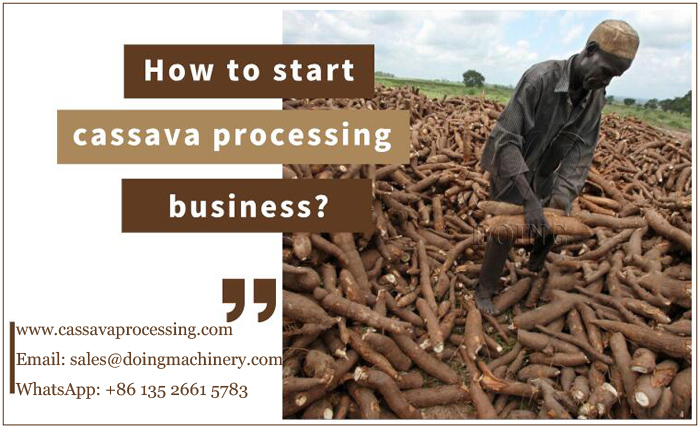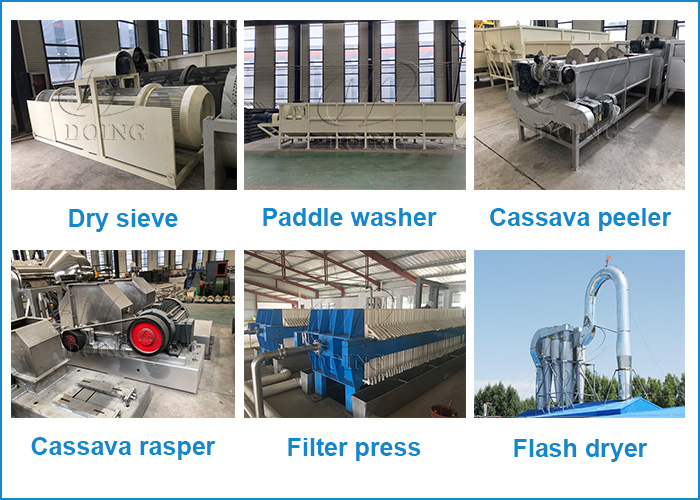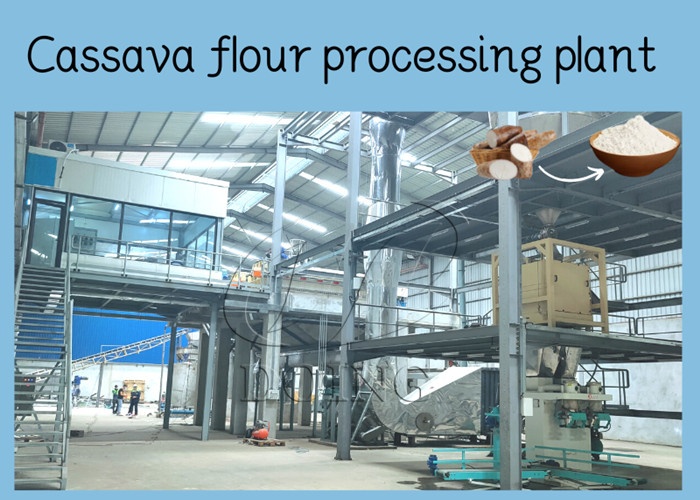 Tel/WhatsApp
Tel/WhatsApp
A guide to expanding from cassava planting to cassava flour processing in Indonesia
Cassava holds a significant place in Indonesia's agricultural landscape. It is the third most consumed food commodity in the country, following rice and corn. Indonesia has a vast potential for cassava cultivation, with around 1.4 million hectares of land dedicated to its growth, yielding approximately 24.56 million tons annually. However, currently, cassava is often underutilized, mainly used for direct consumption or as animal feed. To maximize the commercial value of cassava, a growing number of cassava farmers are expanding into cassava flour processing.
Here, Henan Jinrui provides a comprehensive guide outlining the key steps in Indonesia's transition from cassava planting to cassava flour processing.
1. Market Research & Feasibility Study
Before expanding from cassava planting to cassava flour processing, the first step is to conduct cassava flour market research and feasibility study.
- Demand Analysis: Identify the local and international markets for cassava flour. Cassava flour is widely used in traditional Indonesian foods and has a significant market demand in local. Its diverse applications (e.g., in the food, textile, and pharmaceutical industries) also make it popular in the international market.
- Competitor Analysis: Research existing cassava flour processors in Indonesia (e.g., large-scale producers like PT. Gunung Sewu, as well as small-scale local producers). Study their successful business models.
 Cassava flour processing
Cassava flour processing
2. Business Plan Development
Developing a business plan is also a key step in entering the cassava flour processing industry in Indonesia. The business plan should include investment budget, operation model, target market and other planning.
- Investment Budget: Estimate costs for equipment, labor, utilities, and marketing.
- Operation Model: Determine pricing based on production costs and market rates.
- Target Market: Define short-term (local market penetration) and long-term (export) goals.
3. Building Cassava Supply Chain
From cassava planting to cassava flour processing, ensuring a stable supply of cassava is the key. Even if you plant a lot of cassava in Indonesia, establishing a stable cassava supply chain is also necessary for developing a cassava flour processing business.
- Partnerships: Collaborate with local farmers via contract farming to ensure supply.
- Improve Yield: Use high-yield varieties (e.g., Adira 4, Malang 6) and best farming practices.
- Storage: Build or rent warehouses to store harvested cassava before processing.
 Cassava flour processing plant
Cassava flour processing plant
4. Building Cassava Flour Processing Plant
Before officially starting cassava flour processing in Indonesia, it is necessary to establish a cassava flour processing plant site. The selection of the plant site and the layout of infrastructure are crucial to the stable operation of the cassava flour processing plant.
- Location Selection: Choose a location close to cassava farms to reduce transportation costs.
- Infrastructure Layout: Ensure access to clean water and reliable electricity (or alternative energy sources).
5. Invest Processing Equipment
To process cassava flour in Indonesia, it is necessary to invest in modern processing equipment. Traditional cassava flour processing methods are inefficient and poor quality, which cannot maximize the profit of cassava flour processing. If you are planning to expand from cassava planting to cassava flour processing, Henan Jinrui recommends that you first invest in simple processing equipment.
Cleaning & Peeling Machine – Removes dirt and skin.
Crushing Machine – Cuts cassava into smaller pieces and crush into mash.
Dehydration Machine – Filter press machine for removing water.
Drying Equipment – Flash dryer for drying cassava flour.
Sieving/Packaging Machine – Refines and packs flour.
 Cassava flour processing machines
Cassava flour processing machines
6. Quality Control & Certifications
Good quality can bring high profits, so if you expand from cassava planting to cassava flour processing, it is essential to establish a high-quality control system.
- Food Safety Standards: Comply with Indonesia’s National Agency of Drug and Food Control (BPOM) regulations.
- International Certifications: If targeting exports, consider certifications like ISO, HACCP, or Halal certification.
- Starch Content Testing: Ensure high starch content (above 25%) for premium flour quality.
7. Marketing Strategies
Once you have successfully expanded from cassava planting to cassava flour processing, you will also need to develop a suitable marketing strategy to sell the processed cassava flour faster and bring you greater profits.
- Local Markets: Sell to bakeries, snack producers, and traditional markets in Indonesia.
- Export Opportunities: Target Malaysia, Thailand, Africa, and the Middle East.
- Online Sales: Use platforms like Tokopedia, Shopee, or Alibaba
- B2B Partnerships: Supply to food manufacturers (e.g., noodle, biscuit companies).
 Cassava flour processing plant in Indonesia
Cassava flour processing plant in Indonesia
Suggestions for expanding from cassava planting to cassava flour processing
The above is Henan Jinrui’s comprehensive guidance on the expanding from cassava planting to cassava processing in Indonesia. However, there are still many challenges to successfully complete the transformation. Below are some suggestions from Henan Jinrui to help you successfully complete the transformation from cassava planting to cassava flour processing.
- Small Scale Testing: Start small to refine the process.
- Seasonal Supply: Establish storage facilities or work with multiple farmers to ensure year-round cassava supply.
- Modern Equipment: Invest modern processing equipment for high quality and high efficiency cassava flour production.
Expanding from cassava farming to flour processing in Indonesia presents a lucrative opportunity for farmers and entrepreneurs. By ensuring a stable supply, investing in proper equipment, maintaining quality standards, and implementing strong marketing strategies, businesses can tap into both local and global cassava flour markets. Investing in modern processing equipment can help Indonesian cassava flour processors produce high-quality cassava flour more efficiently and maximize the profits. If you're considering transitioning from cassava planting to cassava flour processing, please contact Henan Jinrui! We'll provide professional guidance and advice to help you start your cassava flour business!
-
 How to Choose a Reliable Bammy Making Plant? Key Factors List
How to Choose a Reliable Bammy Making Plant? Key Factors List
-
 How to Produce International Standard Cassava Starch?
How to Produce International Standard Cassava Starch?
-
 Move Beyond Local Cassava Pressing Machines with Henan Jinrui Reliable Equipment
Move Beyond Local Cassava Pressing Machines with Henan Jinrui Reliable Equipment
-
 Garri Processing vs. Cassava Starch Processing: Which is More Profitable and Easier to Start?
Garri Processing vs. Cassava Starch Processing: Which is More Profitable and Easier to Start?
-
 Investing in Cassava Starch Processing? Start with the Key Equipment for Success in Vietnam/Thailand Markets
Investing in Cassava Starch Processing? Start with the Key Equipment for Success in Vietnam/Thailand Markets
-
 The Potato Starch Processing Opportunity in 2025: Benefits and Challenges
The Potato Starch Processing Opportunity in 2025: Benefits and Challenges
-
 How to Choose Cassava Starch Processing Machine with Limited Capital to Cater for Both Farmers and Market?
How to Choose Cassava Starch Processing Machine with Limited Capital to Cater for Both Farmers and Market?
-
 Sustainable & Eco-Friendly Cassava Processing Solutions
Sustainable & Eco-Friendly Cassava Processing Solutions
-
 Solving 5 Common Challenges in Garri Processing with Modern Machinery
Solving 5 Common Challenges in Garri Processing with Modern Machinery
-
 Advantages of Cassava Starch Separating Machine - Centrifuge Sieve
Advantages of Cassava Starch Separating Machine - Centrifuge Sieve
-
 Henan Jinrui delivers attieke processing equipment to the customer in Côte d'Ivoire
Henan Jinrui delivers attieke processing equipment to the customer in Côte d'Ivoire
-
 Henan Jinrui Successfully Ships Cassava Flour Processing Line to Madagascar Client
Henan Jinrui Successfully Ships Cassava Flour Processing Line to Madagascar Client
-
 Henan Jinrui Advanced Cassava Starch Processing Equipment Wins Over Nigerian Food Processor
Henan Jinrui Advanced Cassava Starch Processing Equipment Wins Over Nigerian Food Processor
-
 Henan Jinrui Delivers Custom 1TPD Garri & Attieke Making Equipment to Benin
Henan Jinrui Delivers Custom 1TPD Garri & Attieke Making Equipment to Benin
-
 Henan Jinrui Secures Order from Benin for 1-Ton Daily Garri and Attieke Processing Machines
Henan Jinrui Secures Order from Benin for 1-Ton Daily Garri and Attieke Processing Machines
CONTACT US
DOING company offers cassava processing machine from single machine to the complete production line. If you want to get more details about cassava processing machine, please contact us:
- Do you want to buy machine?
- Yes, I want to buy machine
- No, I want to learn more in advance.
- What is your raw material?
- Cassava
- Potato
- Sweet potato
- Others
- 2. What is the final product you want to produce?
- Garri
- Cassava flour
- Cassava starch
- Cassava chips
- Attiekie
- Bammy
- Others
- 3.What is your capacity plan?
- Small scale garri machine
- 1ton per day
- 2tons per day
- 3tons per day
- 10tons per day
- 20tons per day
- Others
- 3.What is your capacity plan?
- Small scale
- 5tons per day
- 10tons per day
- 20tons per day
- 50tons per day
- 100tons per day
- Others
- 3.What is your capacity plan?
- Small scale
- 5tons per day
- 10tons per day
- 20tons per day
- 50tons per day
- 100tons per day
- 200tons per day
- 300tons per day
- Others
- 3.What is your capacity plan?
- Small scale
- Middle type
- Large scale
- What is your capacity plan?
- Small scale
- 5tons per day
- 10tons per day
- 20tons per day
- 50tons per day
- 100tons per day
- 200tons per day
- 300tons per day
- Others








